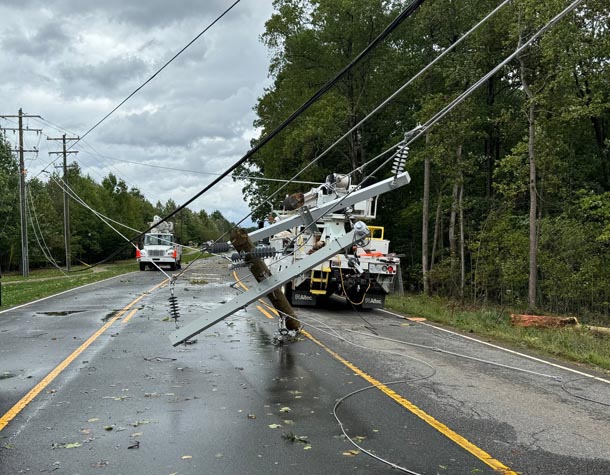Disaster Recovery Information
Top Issues and Needs; Locating Loved Ones; Help for Survivors; Resources for Farmers

Find the updated Living Resource Guide at bit.ly/helene-recovery
Recovery By the Numbers
400 National Guard Personnel
1 million liters of water
600,000 meals
29 shelters
34 storm-related deaths
450,000 customers remain without power
400 roads remain closed
American Red Cross Shelter Count for North Carolina: 28 shelters, population of 1,134, (211 more than yesterday).
Crisis Cleanup has received an unprecedented number of calls across the multi-state impact area. They received 9,000 calls yesterday and expect 15,000 calls today. They have more than 4,250 calls backlogged in phone queues.
Baptists on Mission, among others, have opened mass feeding sites in 7 counties serving many thousands of meals each day.
Top Issues and Needs
– Credit card systems and ATMs are down. Vendors, including landlords, are demanding payment in cash.
– Commercial kitchens: Contact [email protected] if you have access to commercial kitchens in western NC.
– Fuel: Gas is in low supply across the region.
Cell Phone Coverage
Wireless providers are setting up new towers and enabling “disaster roaming” so phones in western NC can connect to any available network. Restart your phone if you lose service. Tip: If your cell coverage drops, try restarting your phone to force it to search for a new network.
You may be able to access OnStar in “crisis mode” if you have a Chevolet, Buick, GMC, or Cadillac vehicle.
Housing
– Evictions: Contact Legal Aid at 866-219-5262.
– Mucking and tarping: Contact Crisis Cleanup at 844-965-1386.
FEMA Assistance
FEMA has begun taking applications for the Individual Assistance Program, which includes money for emergency housing at hotels, immediate recovery needs and more. Call 800-621-3362 or visit DisasterAssistance.gov for more information or to get started on an application.
Disaster Emotional Care
Disaster Distress Helpline (DDH) for Emotional Health. For information call 1-800-985-5990 (press “2” for Spanish). For 24/7 crisis and emotional support for survivors and responders of natural and human-caused disasters go to samhsa.gov/DDH. For any additional resource needs in disaster emotional care, please email [email protected].
Fears of Immigration Enforcement
ICE and CBP do not conduct immigration enforcement activities at protected areas such as along evacuation routes, sites used for sheltering or the distribution of emergency supplies, food or water, or registration sites for disaster-related assistance or the reunification of families and loved ones.
At the request of FEMA or local and state authorities, ICE and CBP may help conduct search and rescue, air traffic de-confliction and public safety missions. ICE and CBP provide emergency assistance to individuals regardless of their immigration status.
– National Low Income Housing Coalition: Even when they stay in-bounds on their policies, the very fact of ICE being there is a chilling effect and contrary to the spirit of the protected areas policy.
– Please take photos of any issues or violations of this policy and send to [email protected] to be escalated to federal advocates.
For more information, please visit www.dhs.gov/news/2024/09/25/dhs-statement-safety-and-enforcement-during-hurricane-helene
Help For Survivors
Call 9-1-1 for rescue or other life-threatening situations. Call 2-1-1 for shelter and supplies.
Call American Red Cross at 1-800-RED-CROSS (1-800-733-2767) if you need assistance, including shelters.
Call Crisis Cleanup at 844-965-1386 to be connected with volunteer organizations who can assist with issues like trees, debris, tarps, and mucking out. Note: Crisis Cleanup cannot assist with social services such as food, clothing, shelter, insurance, or FEMA registration.
The Partnership for Inclusive Disaster Strategies – Disability & Disaster Hotline: Call/Text +1 (800) 626-4959; Email [email protected].
Locating loved ones:
– Call 2-1-1 for their reunification service.
– Red Cross has this form: www.redcross.org/get-help/disaster-relief-and-recovery-services/contact-and-locate-loved-ones/hurricane-helene-reunification.html . In Buncombe County: Call 828-820-2761 (Buncombe County Register of Deeds). More information at BuncombeReady.gov.
Farmers
Crops for mass feeding should contact [email protected].
“Disaster hay” and other needs/offers can be coordinated through www.ncagr.gov/emergency-programs/disaster-information or call 1-866-645-9403.
Coordinate movement of supplies with the state Business Emergency Operations Center to ensure you have access. You can email your supply logistics or movement requests to [email protected], Begin Subject Line with “Logistics Support.” Please include the following info: What are you moving? Why you need special access. When do you plan to move and from where? Where are you going? When will they arrive at the “border to Western NC” and where?
Contact your local Cooperative Extension (ncdisaster.ces.ncsu.edu) to get connected to resources, which will be run by Soil & Water Conservation or USDA Service Centers (Farm Service Agency, Natural Resources Conservation Service).





